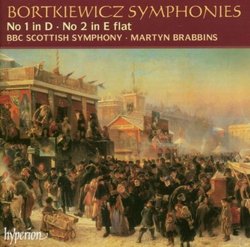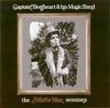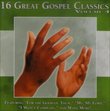| All Artists: Bortkiewicz, Brabbins, BBC Scottish So Title: Symphonies Members Wishing: 0 Total Copies: 0 Label: Hyperion UK Release Date: 10/8/2002 Album Type: Import Genre: Classical Style: Symphonies Number of Discs: 1 SwapaCD Credits: 1 UPCs: 034571173382, 034571173382 |
Search - Bortkiewicz, Brabbins, BBC Scottish So :: Symphonies
CD DetailsSimilar CDs |
CD ReviewsReturn of the Native V. N. Dvornychenko | Rockville, MD | 04/13/2005 (5 out of 5 stars) "The Ukrainian-Russian composer Sergei Bortkiewicz (1877-1952) was a solid member of the Russian Nationalist School, despite having spent most of his life as an émigré. (Bortkiewicz should not be confused with Bortniansky, an earlier composer of liturgical music.) He has unfortunately not received the recognition he deserves, but there are signs this is changing. This CD provides a sampling of the composer's finest and most significant works, his two symphonies. These amply demonstrate his considerable compositional skills, as well as his Russian Nationalist tendencies. The symphonies are also a testament to the intense nostalgia and homesickness resulting from his self-imposed exile. To best understand Bortkiewicz one should look to the Russian Nationalist group. The group was founded by Balakirev, and included Borodin, Rimsky-Korsakov, and Tchaikovsky. (Mussorgsky and Cui were also members of this group, but wrote little symphonic music.) The ideals of the group were carried forward in the next generation by Lyapunov, Kalinnikov, Rachmaninov and Bortkiewicz. The Finish composer Sibelius also belongs to this group - at least as far as his early compositions, and before he developed his own Finish nationalistic style. A primary objective of this group was to develop a uniquely Russian (or at least non-German) style of symphonic music. The style they developed has the following characteristics: 1) use of folk or folk-like themes; 2) use of longer and more flowing themes than is traditional in symphony (as practiced by the Germans and Austrians); 3) a musical development that depended less on modulation, but employs other devices such as contrast and repetition; 4) the frequent use of "restless background strings" endlessly running up and down the scale; 5) frequent woodwind "snippets" for punctuation; 6) placing the scherzo immediately after the opening movement, and 7) perhaps the most famous characteristic, an extended highly melodic slow movement, often with an "oriental" flavor, sad and suggestive of the vast and lonely steppes of Russia. Within the Russian Nationalist School itself how would one characterize Bortkiewicz? Although endowed with considerable melodic gift, Bortkiewicz was not the spinner of endless melisma, in the manner of Tchaikovsky, Kalinnikov and Rachmaninov. His symphonies are perhaps closer to Balakirev and Sibelius, with a large infusion of Tchaikovsky. His music is basically conservative; his one concession to "modernism" is a more "Wagnerian" sound than that of most of the Russian Nationalists. Perhaps this was derived from Rachmaninov and Richard Strauss. These characteristics are amply demonstrated in his Symphony No. 1 in D. It begins with an anguished introduction reminiscent of Sibelius. This agitated and somewhat "busy" tone is continued throughout the main section of the movement - perhaps it reflects the composer's unsettled frame of mind. During this movement there appears a strident march theme reminiscent of one in Tchaikovsky's First Piano Concerto. The second movement is virtually a rewrite of the pizzicato movement of Tchaikovsky's Fourth, but in some ways an improvement - the imitation of balalaika music is much more convincing. The third movement is a plaintive slow movement in the best tradition of the Nationalists; the main theme is worthy of a Puccini heroine. The final movement is vigorous and concludes with a statement of "God Save the Tsar" - familiar to most from the 1812 Overture. The Second Symphony in E Flat begins with a somber introduction similar in style to Balakirev's First and Tchaikovsky's Sixth. This somber tone is carried throughout the movement. Curiously the first movement concluded with an ethereal passage. The final movement contains a brass fanfare reminiscent of Dvorak's Ninth. Toward the end there is a passage somewhat suggestive of Beethoven's Fifth. Without a doubt Bortkiewicz's career suffered from his disorganized life, due to his dislocation, and due to WW II. Much of the information concerning the composer's private life was lost in the destruction of WW II. Slowly some of this information is being reconstituted, and his rightful place in the history of music may yet be restored. The Ukraine is enthusiastically embracing its lost son. Those that enjoy his two symphonies will probably also enjoy his Piano Concerto, available on CD. " If you like Russian music... Wayne A. | Belfast, Northern Ireland | 12/26/2004 (5 out of 5 stars) "The other reviewers here go into great detail about this composer and his music--a tale worth telling. Bortkiewicz was hardly alone as a creative and intelligent man nearly ruined by the horrors of the last century. I don't think even today we have the full measure of the damage that was done to our culture by all that barbarity and violence. If you're the sort of listener who loves to wallow in Tchaikovsky or Rachmaninov (and who doesn't?) then you'll probably enjoy this disc. Bortkiewicz is an unjustifiably obscure composer and his music (on this disc especially) is extremely well-written and engaging with suitable blendings of old style Russian pathos, grandeur, and excitement. At times it may sound like Tchaikovsky but one gets the impression, after a listen or two, that those moments are conscious allusions and not due to lack of originality. There's much to enjoy--the finale of No. 1 is a hoot. The comment has been made, perhaps too often, that he composed as if forty or so years of music never happened. To be fair, he wasn't really that much of a dinosaur and his music often fits in well with that of other traditionalists of his time like Kurt Atterberg and Randall Thompson. There are even almost jazzy elements here and there. I think we tend to oversimplify the trends of that century; a lot went on simultaneously at varying speeds." Another real discovery of Borkiewicz' works-effective but.. David A. Hollingsworth | Washington, DC USA | 11/11/2002 (5 out of 5 stars) "Sergey Eduardovich Bortkiewicz (1877-1952) is enjoying something of a discovery (and in a sense a rediscovery) of his music for over several years. The obscurity had much to do with the circumstances he was under, not really on the quality of his music, which is generally highly inventive and with a strong melodic profile & fervor. The two World Wars and the Russian Revolution effectively destroyed his chances of real success as a composer and as a musician. After studying music at the St. Petersburg Conservatory with Karl van Arek then with Lyadov (he also studied law which he later abandoned), he decided to continue his musical studies in Germany, and enrolled at the Leipzig Conservatory under the tutelages of Jadassohn & Reisenauer (of composition and piano respectively). His love for Berlin was never in doubt & lived there happily with his wife. But the German officials looked at him with suspicion for he was "Russian" and consequently placed him and his wife under house arrest before deporting them back to Russia.But even back home he was treated with disdain in Russia because he was looked upon as a wealthy bourgeois (he came from a wealthy family). And when he returned to his estate in Kharkiv (or Kharkov) in the Ukraine after the First World War, his hopes for a better life vanished: the Soviets destroyed his family estate & the composer and his wife settled in Constantinople (Turkey). But he missed the cultures of Europe & decided to move with his wife to Vienna. After living in Paris for six months, they settled in Berlin for close to five years. The Nazi forces, however, continued to show disdain for anything and anyone Russian & expelled them from Germany. The Bortkiewicz remained in Vienna for the rest of their lives, amidst the incredible hardships during the Second World War. But recognition of his music finally came thereafter and during the celebration of his 75th birthday, concerts were held in his honor. His friends, particularly Hugo van Dalen, a notable Dutch pianist, had a great deal to do with keeping his music, and the essence of the composer, from total oblivion. Some of his works deemed lost are now found, even recently. But the damage was done, and the lesson we shall draw from this is how the weaknesses, the evil, & the ill-fortunes of mankind can damage and ultimately destroy the virtues of creativity & the essences of the blossoming of life itself. But Bortkiewicz' music did blossom, as with Vainberg's during and after similar circumstances which confronted and affected him. And it's highly rewarding to hear the seriousness, the invention, the profundity of his music particularly during the most harshest of circumstances. And if you're familiar with his piano music especially in the Hyperion CD series (along with his rather flamboyant Piano Concerto), you will derive a good deal of pleasure from the symphonies, which are well constructed & rather melodic. The First, entitled "From my Homeland" of 1934 is rather striking, though, truth to tell, not as strong & idiomatic as the First Symphonies of, say Tchaikovsky, Balakirev, Glazunov, Kalinnikov, Lyatoshynsky, and Shostakovich(or of Bortkiewicz' Lamentation & Consolations for that matter). But the piece stands up quite well, with a Hollywoodish, assertive opening that develops into an atmosphere lyrical and yearning in character underpinned by some dramatic & heroic impulses (in a manner of Chopin more or less). The lyrical passages has warmth and substance even if lacking in depth that makes Rachmaninov's and Myaskovsky's scores masterpieces in their own rights. The scherzo, a bit too much in a manner of Rimsky-Korsakov & Tchaikovsky, is effectively dancelike and to my mind witty (Bortkiewicz' excellent orchestration comes huge especially here). But turn to the slow movement and the profundity is at its upmost-sorrowful and lamenting. And while I was more touched by the slow movement of the Second Symphony, this Adagio is not cheap, nor is the finale, which has sparkle, but also a sweeping melody articulated by the strings at 1'07"-ff that has grace as well as dignity. The opening motif of the first movement returns and rather exhilarating coda has reminiscences of both Tchaikovsky's "1812 Overture" & his Solemn Overture on the Danish Anthem, but in the composer's own style. The Second Symphony of 1936/1937 is to me marginally a more substantial composition. The mood throughout is bleak and melancholic, rather sentimental in veins somewhat similar to Tchaikovsky. The passages played by the brass has a funereal quality about it. Even the scherzo is heroic, not as jolly as the scherzo of the First Symphony, but fierced and determined (as if saying I shall continue to move on). But turn to the Andante sostenuto movement and the anguish is even more profound. Listen to the innocent, remotely hopeful melody announce by the clarinet at 2'45" only for the strings to pick up that melody with a greater poignancy of sorrow and lamentation. Rather moving stuff, which compelled me to expect the finale to carry on within that same level. But instead the finale, notwithstanding some of that Tchaikovskian pomposity & poetic moments, comes across as lacking that wroughtfulness that would have enhance the overall appeal of the work. Nevertheless, Martyn Brabbins and the BBC Scottish Symphony come up huge in these surveys, with their approach highly vivid and measured where required. Their sympathetic readings are never in doubt & there's warmth underlying their playing. To no surprise, the Hyperion recording is of its usual warm & atmospheric incandescence and the booklet essay continues to be well within the record company's high standards of presentation (as does the cover painting of Makovsky). Malcolm Henbury-Ballan, the author of the booklet essay states "Here at last, in his homeland, Bortkiewicz has been re-established and honored as a composer of great beauty, passion, and melody. The exile has finally returned home." A rather beautiful sentiment indeed!"
|




